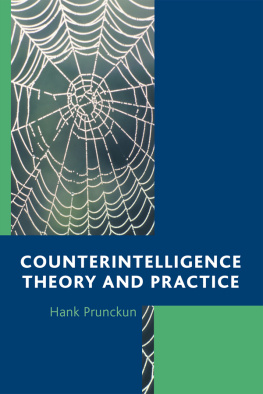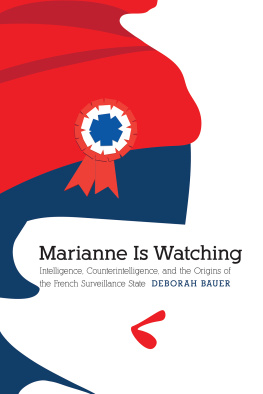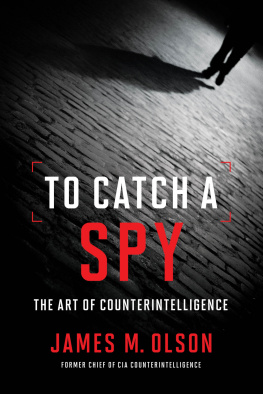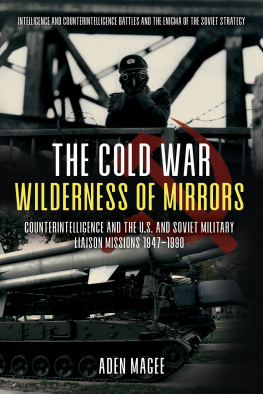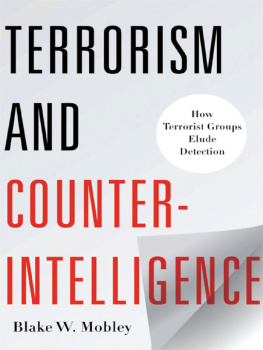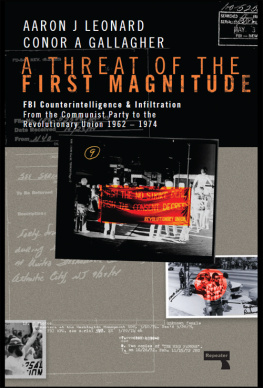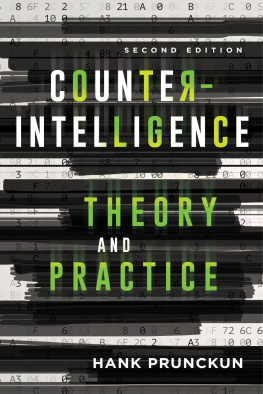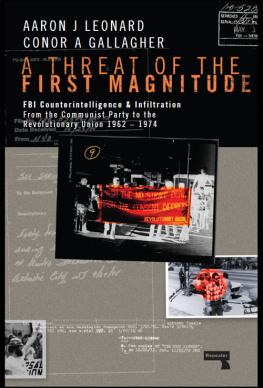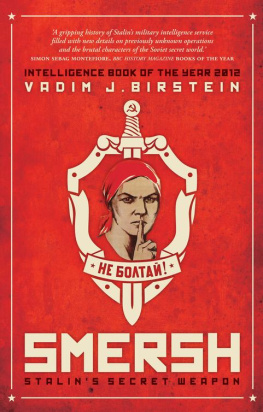Prunckun - Counterintelligence theory and practice
Here you can read online Prunckun - Counterintelligence theory and practice full text of the book (entire story) in english for free. Download pdf and epub, get meaning, cover and reviews about this ebook. City: Lanham, Md., year: 2012, publisher: Rowman & LIttlefield Publishers, genre: Politics. Description of the work, (preface) as well as reviews are available. Best literature library LitArk.com created for fans of good reading and offers a wide selection of genres:
Romance novel
Science fiction
Adventure
Detective
Science
History
Home and family
Prose
Art
Politics
Computer
Non-fiction
Religion
Business
Children
Humor
Choose a favorite category and find really read worthwhile books. Enjoy immersion in the world of imagination, feel the emotions of the characters or learn something new for yourself, make an fascinating discovery.
Counterintelligence theory and practice: summary, description and annotation
We offer to read an annotation, description, summary or preface (depends on what the author of the book "Counterintelligence theory and practice" wrote himself). If you haven't found the necessary information about the book — write in the comments, we will try to find it.
Prunckun: author's other books
Who wrote Counterintelligence theory and practice? Find out the surname, the name of the author of the book and a list of all author's works by series.
Counterintelligence theory and practice — read online for free the complete book (whole text) full work
Below is the text of the book, divided by pages. System saving the place of the last page read, allows you to conveniently read the book "Counterintelligence theory and practice" online for free, without having to search again every time where you left off. Put a bookmark, and you can go to the page where you finished reading at any time.
Font size:
Interval:
Bookmark:
Counterintelligence Theory and Practice
Security and Professional Intelligence
Education Series
Series Editor: Jan Goldman
In this postSeptember 11, 2001, era there has been rapid growth in the number of professional intelligence training and educational programs across the United States and abroad. Colleges and universities, as well as high schools, are developing programs and courses in homeland security, intelligence analysis, and law enforcement, in support of national security.
The Security and Professional Intelligence Education Series (SPIES) was first designed for individuals studying for careers in intelligence and to help improve the skills of those already in the profession; however, it was also developed to educate the public in how intelligence work is conducted and should be conducted in this important and vital profession.
Communicating with Intelligence: Writing and Briefing in the Intelligence and National Security Communities, by James S. Major. 2008.
A Spys Rsum: Confessions of a Maverick Intelligence Professional and Misadventure Capitalist, by Marc Anthony Viola. 2008.
An Introduction to Intelligence Research and Analysis, by Jerome Clauser, revised and edited by Jan Goldman. 2008.
Writing Classified and Unclassified Papers for National Security: A Scarecrow Professional Intelligence Educational Series Manual, by James S. Major. 2009.
Strategic Intelligence: A Handbook for Practitioners, Managers, and Users, revised edition by Don McDowell. 2009.
Partly Cloudy: Ethics in War, Espionage, Covert Action, and Interrogation, by David L. Perry. 2009.
Tokyo Rose / An American Patriot: A Dual Biography, by Frederick P. Close. 2010.
Ethics of Spying: A Reader for the Intelligence Professional, edited by Jan Goldman. 2006.
Ethics of Spying: A Reader for the Intelligence Professional, Volume 2, edited by Jan Goldman. 2010.
A Womans War: The Professional and Personal Journey of the Navys First African American Female Intelligence Officer, by Gail Harris. 2010.
Handbook of Scientific Methods of Inquiry for Intelligence Analysis, by Hank Prunckun. 2010.
Handbook of Warning Intelligence: Assessing the Threat to National Security, by Cynthia Grabo. 2010.
Keeping U.S. Intelligence Effective: The Need for a Revolution in Intelligence Affairs, by William J. Lahneman. 2011.
Words of Intelligence: An Intelligence Professionals Lexicon for Domestic and Foreign Threats, Second Edition, by Jan Goldman. 2011.
Counterintelligence Theory and Practice, by Hank Prunckun. 2012.
S.P.I.E.S
Counterintelligence Theory and Practice
Hank Prunckun
ROWMAN & LITTLEFIELD PUBLISHERS, INC.
Lanham Boulder New York Toronto Plymouth, UK
Published by Rowman & Littlefield Publishers, Inc.
A wholly owned subsidiary of The Rowman & Littlefield Publishing Group, Inc.
4501 Forbes Boulevard, Suite 200, Lanham, Maryland 20706
www.rowman.com
10 Thornbury Road, Plymouth PL6 7PP, United Kingdom
Copyright 2012 by Rowman & Littlefield Publishers, Inc.
All rights reserved. No part of this book may be reproduced in any form or by any electronic or mechanical means, including information storage and retrieval systems, without written permission from the publisher, except by a reviewer who may quote passages in a review.
British Library Cataloguing in Publication Information Available
Library of Congress Cataloging-in-Publication Data
Prunckun, Henry W.
Counterintelligence theory and practice / Hank Prunckun.
p. cm.
Includes index.
ISBN 978-1-4422-1911-3 (alk. paper)ISBN 978-1-4422-1933-5 (pbk. : alk. paper)ISBN 978-1-4422-1912-0 (electronic)
1. Intelligence service. I. Title.
JF1525.I6P775 2012
327.1201dc23
2012030929
 The paper used in this publication meets the minimum requirements of American National Standard for Information Sciences Permanence of Paper for Printed Library Materials, ANSI/NISO Z39.48-1992.
The paper used in this publication meets the minimum requirements of American National Standard for Information Sciences Permanence of Paper for Printed Library Materials, ANSI/NISO Z39.48-1992.
Printed in the United States of America
To the memory of my father, who, almost half a century ago, was in the vanguard of those who recognized the value of open-source intelligence. In this regard, he taught me that whatever you wanted to know could be found in books. His view of knowledge changed my world and I hope I am able to pass on his insight in order to keep the spirit of knowledge philanthropy, which he engendered in his approach to learning, alive.
Counterintelligence is one of the most popularized aspects of intelligence work. Intelligence analysis, imagery interpretation, and developing the intelligence requirements (i.e., questions that need to be answered) all take a backseat to the media and public perception of the glamour of counterintelligence. In a nutshell, counterintelligence is preventing your enemy from knowing what you are doing, in your determination to collect information on them. If collecting information in order to turn it into intelligence is the goal, then counterintelligence is to deny that effort to collect that information.
There are plenty of counterintelligence books that display the cat-and-mouse of intelligence operatives who seek to avoid getting captured by the enemy. A quick search of novels and movies over the last fifty years produces a treasure trove of results. Additionally, in the academic world, there are countless books on the history of counterintelligence operations. However, this book is different.
I am extremely proud to say that this book is one of the few unclassified publications that actually describes what constitutes a successful counterintelligence operation, as well as the elements that compose such an operation. In essence, counterintelligence is about a governments ability to keep secrets, and this book explains how to do it from both an academic and practitioners point of view, which makes this a very special publication.
Jan Goldman, EdD
Series Editor
The English philosopher and scientist Francis Bacon is attributed with saying: He that will not apply new remedies must expect new evils; for time is the greatest innovator. If intelligence officers and analysts are to avoid new evils when it comes to the security of classified information and the secret operations these data underpin, it follows that they must apply new remedies. To do this, a book that addresses the issues of counterintelligence theory and practice is needed.
This book attempts to fill a void in the subject literature that has remained for some time. For instance, during my twenty-eight years as a practitioner in the fields of security, investigation, intelligence, and research, I have found that there was a dearth of texts available on counterintelligence that discussed in simple, clear terms the crafts theory and practice. This is not to say that there are only a few texts on the subjectto the contrary, there are many. However, many of these books tend to be written with disappointingly little practical explanation and no theoretical base. Because of this, many of these texts view counterintelligence simply as security, which it is not. As such, although there are a number of texts on library shelves that contain the title counterintelligence, they are, in my view, narrow and somewhat limiting in their coverage and do not place counterintelligence in the context in which it needs to sit. For the new recruit to counterintelligence, or for the instructor teaching the subject, these texts leave them wanting.
Font size:
Interval:
Bookmark:
Similar books «Counterintelligence theory and practice»
Look at similar books to Counterintelligence theory and practice. We have selected literature similar in name and meaning in the hope of providing readers with more options to find new, interesting, not yet read works.
Discussion, reviews of the book Counterintelligence theory and practice and just readers' own opinions. Leave your comments, write what you think about the work, its meaning or the main characters. Specify what exactly you liked and what you didn't like, and why you think so.

